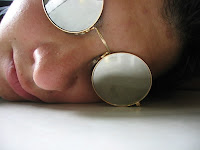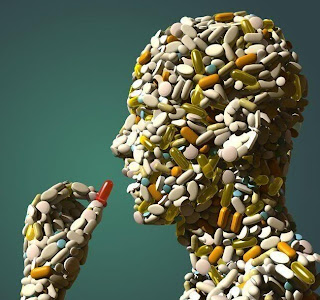In general, insomnia medications are most effective when used for short term situations for insomnia help. Examples include travel across time zones or recovering from a medical condition. Sometimes prescription sleep aids are used briefly at the beginning of insomnia treatment, especially if the sleep disorder has been severe. If sleep medications are used over the long term, they would be best used “as needed” instead of daily to avoid dependence and tolerance.
 In many cases, doctors will prescribe sleeping aids for insomia help and insomnia treatment. All insomnia medications should be taken shortly before bed time. Do not attempt to drive or perform other activities that require concentration after taking an insomnia medication as the sleeping aids will make you sleepy. Sleep medications should be used in combination with natural insomnia treatments.
In many cases, doctors will prescribe sleeping aids for insomia help and insomnia treatment. All insomnia medications should be taken shortly before bed time. Do not attempt to drive or perform other activities that require concentration after taking an insomnia medication as the sleeping aids will make you sleepy. Sleep medications should be used in combination with natural insomnia treatments.Listed below are most popular drugs used to relief insomnia.
These have fewer side effects than Benzodiazepine drugs and act more specifically on one area in the brain. Nevertheless they are listed as controlled substances despite having less dependency.
Ambien (Zolpidem): The original version works well at helping you fall asleep faster, but some people tended to wake up in the middle of the night. This insomnia medication is usually limited to short-term treatment periods of 1-2 weeks or less. Ambien CR is a new extended release version. It helps you fall asleep within 15 to 30 minutes, and the extended release part helps you stay asleep. You should not be taken Ambien or Ambien CR if you are not able to get a full night's sleep, which ia at least 7 to 8 hours.
The FDA has approved a prescription oral spray called Zolpimist, which contains Ambien's active ingredient, for the short-term insomnia treatment caused by difficulty falling asleep.
Lunesta (ESZOPICLONE): Lunesta made by Sepracor, is one of the newest insomnia drugs available. Lunesta helps you get to sleep quickly, and is to be taken just before bed, not with alcohol, and is meant for times when you have a full 7 to 8 hours of sleep available; otherwise you may feel groggy the next day. That is probably the most common complaint people have about taking prescription sleep aids, is that they feel tired or hung over still the next day. Eszopiclone belongs to a class of drugs known as hypnotics. Lunesta enhances GABA activity, working with the natural sleep cycle and chemistry in your body. Unlike some other prescription sleep aids, people taking Lunesta have not been seen to build up a tolerance for the drug, meaning that it remains effective even after long periods of usage.
Rozerem (RAMELTEON): This is a new insomnia medication. Rozerem is made by Takeda Pharmaceuticals and is a non-controlled substance, meaning it is less likely to lead to dependency or abuse and can be used long term. Rozerem works like a natural substance called melatonin that is produced by your body. It helps regulate your sleeping cycle (circadian rhythm). It is prescribed for people who have difficulty falling asleep.
 Sonata (Zaleplon): Sonata is made by King Pharmaceuticals. This insomnia medication is used for a short time to treat people with trouble falling asleep. Of all the new prescription sleep aids, Sonata has a half life of just 1 hour, so it leaves your system more quickly than other insomnia medications. That means you can try to fall asleep on your own. Then, if you're still staring at the clock in the middle of the night, you can take it without feeling drowsy next morning. If you have other sleep problems such as not being able to sleep through the night, this medication may not be right for you. Zaleplon is known as a hypnotic. It works on certain centers in the brain to relax you and help you fall asleep faster.
Sonata (Zaleplon): Sonata is made by King Pharmaceuticals. This insomnia medication is used for a short time to treat people with trouble falling asleep. Of all the new prescription sleep aids, Sonata has a half life of just 1 hour, so it leaves your system more quickly than other insomnia medications. That means you can try to fall asleep on your own. Then, if you're still staring at the clock in the middle of the night, you can take it without feeling drowsy next morning. If you have other sleep problems such as not being able to sleep through the night, this medication may not be right for you. Zaleplon is known as a hypnotic. It works on certain centers in the brain to relax you and help you fall asleep faster.• Antidepressants
Some doctors prescribe antidepressants because their patients have both depression and insomnia. Insomnia and depression often occur together, but which is the cause and which is the symptom is often unclear. Thus, some medication for depression and insomnia are particularly effective in treating sleeplessness and anxiety that's caused by depression.
Desyrel (TRAZODONE): Antidepressant medications are used to treat a variety of conditions, including depression and other mental/mood disorders. These medications can help prevent suicidal thoughts/attempts and provide other important benefits. However, studies have shown that a small number of people (especially people younger than 25) who take antidepressants for any condition may experience worsening depression, other mental/mood symptoms, or suicidal thoughts/attempts. Therefore, it is very important to talk with the doctor about the risks and benefits of antidepressant medication (especially for people younger than 25), even if treatment is not for a mental/mood condition.
Elavil (amitriptyline) is a central nervous system depressant, and should be used very cautiously in combination with any medication that warns it 'may cause drowsiness,' or increases your level of alertness. Elavil belongs to a class of drugs called tricyclic antidepressants. Elavil is prescribed to treat depression, bulimia, chronic pain from a variety of conditions, reduce the incidence of chronic headache or migraine, ulcers, uncontrollable hiccups, primary insomnia, and to control the involuntary crying and laughing experienced by individuals with multiple sclerosis.
Pamelor (Nortriptyline) is used to elevate the mood of patients with depression. Nortriptyline is also a sedative and is useful in depressed patients with insomnia, restlessness, and nervousness. It is one of the drugs known as tricyclic antidepressants.
Serzone (nefazodone): Serzone is an antidepressant medication. It affects chemicals in the brain that may become unbalanced and cause depression. Serzone is used to relieve symptoms of depression such as feelings of sadness, worthlessness, or guilt; loss of interest in daily activities; changes in appetite; tiredness; sleeping too much; insomnia; and thoughts of death or suicide. In rare cases, treatment with Serzone has been associated with serious liver problems, sometimes resulting in liver transplant or death.
Desyrel (trazodone): Trazodone is a antidepressant medication. It is thought to increase the activity of one of the brain chemicals (serotonin) which may become unbalanced and cause depression. It may also be used for relief of anxiety disorders (eg, sleeplessness, tension) and chronic pain.
Adapin (Doxepin): Doxepin is in a group of drugs called tricyclic antidepressants. Doxepin affects chemicals in the brain that may become unbalanced. Doxepin is used to treat symptoms of depression and/or anxiety associated with alcoholism, psychiatric conditions, or manic-depressive conditions.
• Antipsychotic Medications
Seroquel (quetiapine): Seroquel is an antipsychotic medication. It works by changing the actions of chemicals in the brain. Seroquel is used to treat the symptoms of psychotic conditions such as schizophrenia and bipolar disorder (manic depression) in adults and children who are at least 10 years old.
Zyprexa (olanzapine): Zyprexa helps manage symptoms of schizophrenia, the manic phase of bipolar disorder, and other psychotic disorders. It is thought to work by opposing the action of serotonin and dopamine, two of the brain's major chemical messengers. The drug is available as Zyprexa tablets and Zyprexa Zydis, which dissolves rapidly with or without liquid.
• Over-the-Counter Sleep Aids
 Most of these sleeping pills are antihistamines. They generally work well but can cause some drowsiness the next day. They're safe enough to be sold without a prescription. However, if you're taking other drugs that also contain antihistamines like cold or allergy medications you could inadvertently take too much.
Most of these sleeping pills are antihistamines. They generally work well but can cause some drowsiness the next day. They're safe enough to be sold without a prescription. However, if you're taking other drugs that also contain antihistamines like cold or allergy medications you could inadvertently take too much. Excedrin PM (Diphenhydramine): It is an antihistamine. It blocks the effects of the naturally occurring chemical histamine in the body. Diphenhydramine prevents sneezing; itchy, watery eyes and nose; and other symptoms of allergies and hay fever. The combination of acetaminophen and diphenhydramine is used to treat runny nose, sneezing, watery eyes, and pain or fever caused by allergies, the common cold, or the flu. This medication is also used to treat night time pain and help you sleep.
Unisom (Doxylamine): Treating occasional sleeplessness and reducing difficulty falling asleep. Unisom is an antihistamine. It works by depressing the central nervous system (brain) to produce drowsiness.
Benadryl (diphenhydramine): Benadryl is an antihistamine. Diphenhydramine blocks the effects of the naturally occurring chemical histamine in the body. Benadryl is used to treat sneezing; runny nose; itching, watery eyes; hives; rashes; itching; and other symptoms of allergies and the common cold. Benadryl is also used to suppress coughs, to treat motion sickness, to induce sleep, and to treat mild forms of Parkinson's disease.
Nytol (Diphenhydramine): Treating occasional sleeplessness and reducing difficulty falling asleep. Nytol is an antihistamine. It works by depressing the central nervous system (brain) to produce drowsiness.
Sominex (Acetaminophen): Relieving short-term sleeplessness due to minor aches and pains. Sominex is an antihistamine and analgesic combination. Sominex causes drowsiness to help you fall asleep. It works in certain areas of the brain and nervous system to decrease pain.
• Keep in mind that sleeping pills are designed as sedatives and depressants and should not be taken without a doctor’s supervision and consultation.







